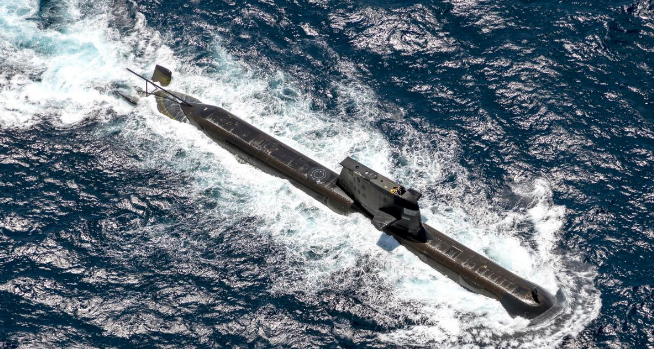Britain’s nuclear-powered submarines are to use Australia as a base so that they can have a more persistent presence in the Indo-Pacific region under plans discussed by ministers.
Senior government sources said that the AUKUS pact could lead to the Royal Navy’s £1.4 billion Astute-class attack submarines undergoing deep maintenance in the region so they can stay deployed for longer rather than returning to the Faslane naval base in Scotland.
The plans would materialise once the Australians start building their own fleet of at least eight nuclear-powered submarines over the coming years with the help of the British and Americans.
The source said that the trilateral pact announced last week “opens up opportunities” for the UK, adding: “You’ve got another base … if you want to have more of a persistent presence you need access to maintenance.”
The Royal Navy has four Astute-class submarines, with three still being built, and two of the older Trafalgar-class submarines. In addition there are four Vanguard-class submarines armed with Trident nuclear missiles.
James Peddell, a former defence technology attaché in Washington with experience in submarine technology, said that a base in Australia could allow UK submarines with conventional weapons to have a permanent presence in the region, and also enable cost-sharing between the allies.
Speaking as part of a panel on the Indo-Pacific organised by Sibylline, a geopolitical risk firm, he said that Australian and British submarines operating in the region could “bring the power of a submarine right up to the doorstep of China”.
He said: “You can bring it in closer, in a stealthy way. You can do intelligence and surveillance, you can project power … and give protection [to surface warships].”
The Royal Navy submarines armed with conventional weapons typically deploy for four to five months before returning to base. One of the longest-ever submarine patrols was in 2013 when a Trafalgar-class nuclear-powered submarine, HMS Trenchant, returned from an 11-month deployment.
Ministers want future submarines to be able to stay out in the Indo-Pacific for longer as part of a wider government “tilt” towards the region.
Explaining how the UK could work with Australia in future, a defence source said that submarines would not have to travel “all the way round the world” for maintenance. “Having the option of another location where you can not just berth but do maintenance is a good thing. They are like lily pads — there aren’t many of them.”
A report by Dr Paul Dorfman, a former MoD adviser who chairs the Nuclear Consulting Group think tank, said that the UK’s coastal military nuclear infrastructure, including Faslane, was “profoundly vulnerable to flooding” from the sea level rise and storms.
The submarine deal, which was announced as part of the wider AUKUS pact between the UK, US and Australia, caused a diplomatic crisis with France, which had originally agreed to supply Australia with 12 diesel electric submarines. After Australia tore up the deal in favour of the one with the UK and US, France recalled its ambassadors from Australia and the US. A meeting scheduled for this week between Ben Wallace, the defence secretary, and his French counterpart was also cancelled.
Tobias Ellwood, chairman of the defence select committee, told the Commons that France had “overreacted” to losing a big procurement deal, but said AUKUS prompted questions about the leadership of Nato after a “bruised” departure from Afghanistan.
General Sir James Everard, the recently retired former deputy supreme Allied commander of Nato, who is now a mentor for the alliance, told the panel that the pact had raised issues of “trust”, however he hoped it would not undermine the alliance, which was more focused on Russia and terrorism.
During defence questions in the Commons, Wallace claimed that the UK and France were “joined at the hip” and insisted there was “no sneakiness behind the back” as he sought to downplay suggestions of a rift between the two nations.
He said: “There is absolutely no intent here by the United Kingdom government to slight, upset or drive a wedge between us and France.”
Liz Truss, the new foreign secretary, touched down in New York alongside Boris Johnson as they both prepare to meet President Biden in Washington tomorrow.
She will also attend the UN summit, where she will come into contact with the French, though the extent of any planned conversations was unclear.








































admin in: How the Muslim Brotherhood betrayed Saudi Arabia?
Great article with insight ...
https://www.viagrapascherfr.com/achat-sildenafil-pfizer-tarif/ in: Cross-region cooperation between anti-terrorism agencies needed
Hello there, just became aware of your blog through Google, and found ...